SNP dismisses IFS warning over full financial control
- Published
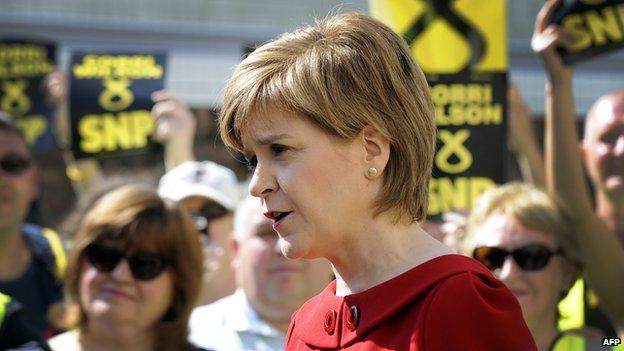
The IFS said fiscal responsibility would 'likely entail substantial spending cuts or tax rises'
SNP leader Nicola Sturgeon has dismissed fresh warnings over full financial control in Scotland.
New analysis from the Institute for Fiscal Studies, external (IFS) claims Scotland's finances would fall behind the rest of the UK's leading to a "fiscal gap" of £9.7bn by the end of the decade.
Labour said it proved the SNP's plans would require "massive spending cuts".
Ms Sturgeon accused her opponents of throwing up a "smokescreen" to detract from austerity "in the here and now."
Full fiscal responsibility or autonomy would see Scotland gain complete control of taxation and spending, including most North Sea oil revenue, with Edinburgh paying London for shared services such as defence and foreign affairs.
The IFS analysis suggests that Scotland's fiscal position will improve during the next Westminster parliament as the deficit is reduced, but that the UK's position as a whole will improve faster.
This would leave a gap which could result in spending cuts or a dramatic increase in taxes, according to the IFS.
'Fiscal gap'
The think tank predicts that Scotland's budget deficit relative to economic output will fall - from 8.6% of gross domestic product (GDP) in 2015/16 to 4.6% in 2019/20.
But this is compared to a predicted budget deficit for the UK as a whole of 4% of GDP in 2015/16 turning to a surplus of 0.3% by 2019/20.
Scotland's shortfall or "fiscal gap" would therefore rise from £7.6bn in 2015/16 to £9.7bn in 2019/20 according to the IFS.
The SNP's manifesto, external, published on Monday, states that the "transition to full fiscal responsibility - and agreement of the detailed fiscal framework that would underpin it - would take a number of years."
But David Phillips, of the IFS, insisted that delaying for a few years "would not on its own deal with the fiscal gap".
Key priorities
SNP
Main pledges
- Spending increase of 0.5% a year, enabling £140bn extra investment
- Annual UK target of 100,000 affordable homes
- Increase in minimum wage to £8.70 by 2020
- Restore the 50p top income tax rate for those earning more than £150,000; introduce a mansion tax and a bankers' bonus tax
- Build an alliance against the renewal of Trident
- Retain the triple lock on pensions and protect the winter fuel allowance

"It would remain the case that full fiscal responsibility would likely entail substantial spending cuts or tax rises in Scotland," he said.
"A big and sustained rebound in oil revenues or significantly higher growth" would help but neither could be relied upon, added Mr Phillips.
The IFS acknowledged that, if the Scottish government could grow the economy faster than the UK average, then the gap would shrink.
But, it said, there was "no guarantee" of such expansion, and closing the gap by 2019/20 would require Scottish revenue per person to grow by 4.5% per year, more than twice the rate forecast for the UK as a whole.
Furthermore, SNP policies to invigorate the economy, perhaps by cutting corporation tax and air passenger duty while increasing spending on childcare would, "at least in the short to medium run, cost the government money, and widen rather than shrink the fiscal gap, even if they did boost growth", according to the analysts.
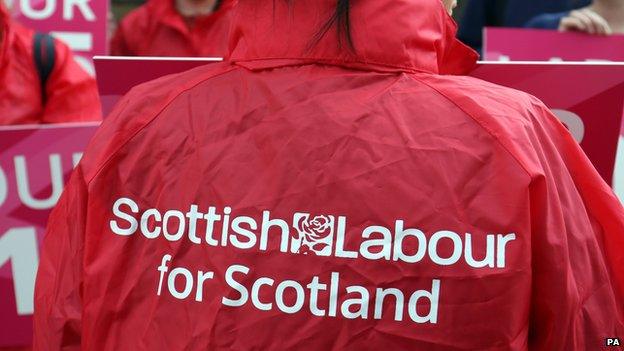
Scottish Labour said the SNP had signed up to cuts that 'would make even the Tories blush'
Commenting on the IFS document, Scottish Labour's deputy leader Kezia Dugdale said the experts had confirmed that the SNP had "signed up to massive spending cuts that would make even the Tories blush."
She said the nationalists' claims on the subject had been "demolished by the IFS" which had confirmed that delaying the plan for full fiscal responsibility would "only make things worse".
The Scottish Conservative's enterprise spokesman Murdo Fraser said the SNP were in full retreat on full fiscal autonomy which would "create a black hole in our public finances which would keep getting deeper."
It would, he said, "be a disaster for business and taxpayers."
SNP 'crushed'
The Scottish Liberal Democrat leader Willie Rennie said the IFS report had "crushed the headline SNP commitment before the ink was dry on their manifesto."
A vote for the SNP meant "endorsing substantial tax rises or spending cuts for Scotland," he said.
But speaking on the BBC's Scotland 2015 programme, Ms Sturgeon insisted the IFS figures were "academic projections for a status quo situation" which could be improved with extra powers for the Scottish parliament.
The First Minister proposed devolution of powers over business taxes, employment, the minimum wage and welfare to allow ministers in Edinburgh to "grow our economy faster, get more people into jobs, get more people paying taxes."
"The referendum 'Project Fear' campaign has been reborn before our eyes," said the SNP leader.
- Published20 April 2015
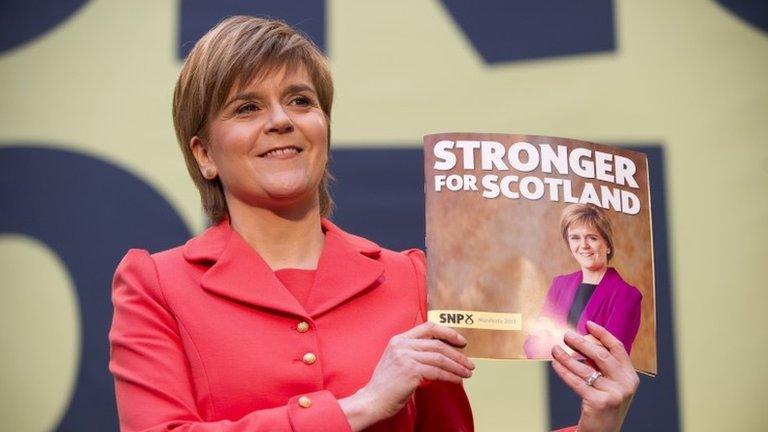
- Published20 April 2015
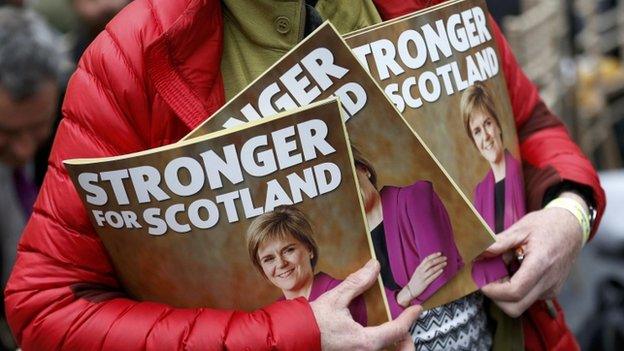
- Published20 April 2015
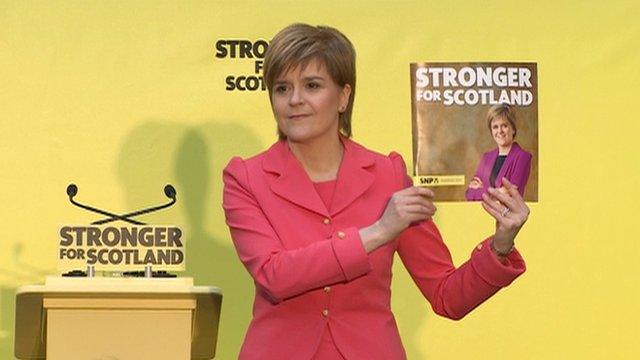
- Published20 April 2015